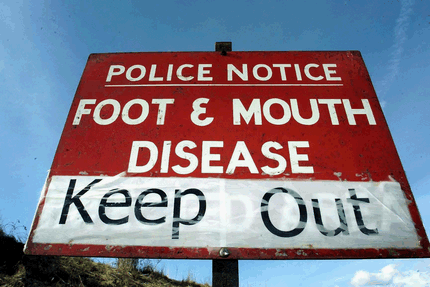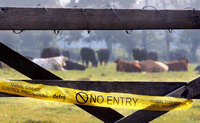A major animal welfare crisis is descending upon the hill farms of northern England

Livestock that should be moving off upland grazing is stranded by foot and mouth restrictions on pasture that is rapidly losing the ability to keep them alive.
Mule gimmer lambs that should have been turned into cash by now are still costing money as farmers turn to trough feeding in a last-ditch effort to try to save at least some grass for breeding ewes in the run-up to tupping time.
It is a season where the traditional cycle of hill farming is lurching headlong towards disaster as farmers constantly look at any option that can help them salvage at least some of their autumn income.
This time last year Cumbria farmer Gordon Kyle had just averaged £59 apiece for Mule gimmer lambs produced on his farm at Walton, near Carlisle. He’s now got 1100 lambs still on the farm and while he has two regular Midlands buyers who are prepared to wait until later in the autumn for both tupping and running lambs, it is still leaving a question mark over the future of his remaining lamb crop.
“It’s totally disrupted everything. You just keep trying to work out how you can get through it; perhaps we’ll have to keep some gimmer lambs and tup them ourselves, sell some and kill some – but it’s difficult to plan when you have no idea what’s going to happen,” says Gordon Kyle.
He reckons he’s got about two weeks grazing left for his gimmer lambs; bought-in feed costs are “going through the roof” but he will be forced to maintain high levels of trough feeding if he is to save much-needed autumn grass for breeding ewes.

A new building at Gordon Kyle’s farm has been hurriedly finished to cope with 100 suckled calves that were booked into forthcoming sales but will now have to be housed and fed until they can be sold – all adding to the escalating costs faced by northern hill farmers.

While the Lazonby sale ring in the heart of east Cumbria would normally have been alive with its autumn gatherings where up to 20,000 Mule gimmer lambs can be sold in a day, this year has seen it become the venue for urgent talks between farmers and NFU representatives.
There has been a hint of welfare schemes and possibly zoning-off part of the UK to enable sales to resume in areas well away from the foot and mouth infection – but with no contingency plans in place should the outbreak restrictions be protracted, hill farmers remain under intense pressure.
Off-loading the lower end of Mule breeding lambs on to the prime market – either on a welfare scheme or voluntarily as a means of generating some income – isn’t an option relished being relished by Cumbria by farmers who take a great pride in producing breeding stock.
And with a weak prime lamb market an influx of thousands of extra lambs will only depress the price even further.
Stephen Graham of Miller Hill, Gilsland, Carlisle is among many hit by the prime lamb price crash this week. His lambs in Carlisle were leaving him with just £25 after commission and transport.
“They’re costing me £40 to produce and every lamb has a retail value in the supermarket at £100. It’s not sustainable,” says Stephen Graham.

But North of England Mule Sheep Association secretary Dorothy Bell urged Mule breeders and buyers to “hold firm” for a few days. She’s hopeful that the urgent need to move sheep off hill farms in the north may lead to the zoning-off the high risk area around Surrey and allow trading to resume in the north of England.
“We really do need this to happen. We know that buyers want to come north to buy sheep and if we do get the go-ahead we are proposing that our sale calendar would continue to run with sales taking place as scheduled. We just have to wait and see what DEFRA decides,” says Dorothy Bell.
If breeding sheep sales in the north were given the green light the priority would have to be given to selling shearlings and two-shear Mules – of which there are about 50,000 already catalogued. Sales of the 150,000 Mule gimmer lambs – most of which are still on farms after only two sales went ahead just before the latest movement ban – would hopefully be allowed to follow soon after.
